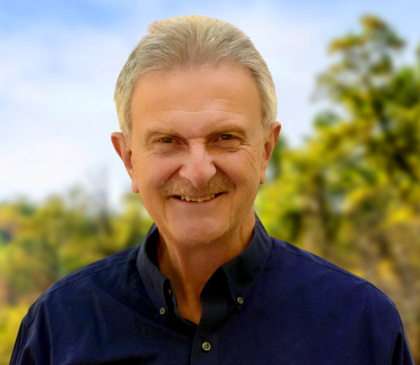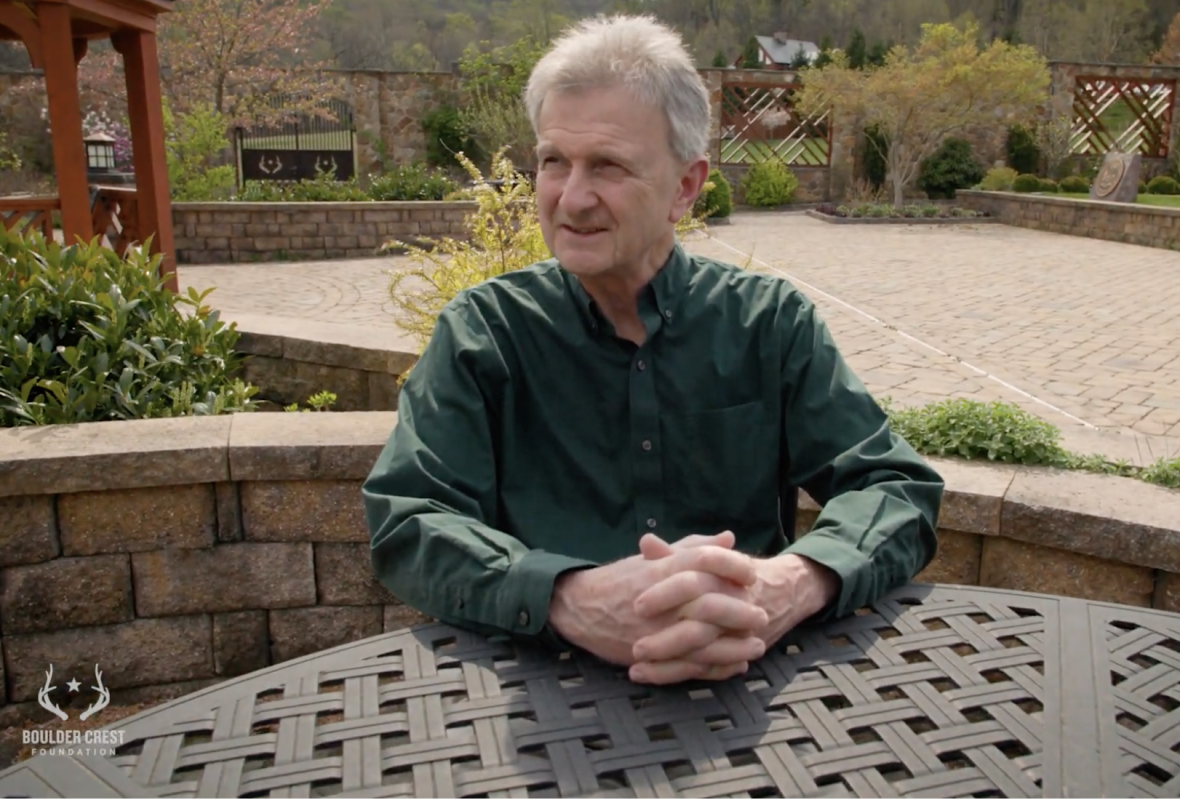

Dr. Richard Tedeschi is Executive Director of the Boulder Crest Institute for Posttraumatic Growth, in Bluemont, Virginia, where he has been one of the developers of programs based on Posttraumatic Growth principles to help combat veterans and first responders. He is also Professor Emeritus in the Department of Psychological Science at the University of North Carolina at Charlotte, where he served for 42 years.
Rich grew up in Connecticut and received his undergraduate degree in Psychology from Syracuse University. He received a scholarship from the 4th Marine Division that enabled him to attend. His father served with the 4th Marines in World War II and was a Purple Heart recipient. The scholarship program was set up by veterans of the 4th Marines for children of veterans who had died.
Rich received his Ph.D. in Clinical Psychology from Ohio University and was a Clinical Psychology Intern at the School of Medicine at the University of North Carolina at Chapel Hill. After finishing his training in 1976, he accepted a faculty position at the University of North Carolina at Charlotte, from which he retired as Professor of Psychological Science in 2018. During his time at UNC Charlotte, he served as the Coordinator of the Clinical/Community Psychology Master’s degree program and was a member of the Core Faculty for the Ph.D. program in Health Psychology. He taught courses in Ethics and Professional Issues, Psychology of Personality, Positive Psychology, Abnormal Psychology, Integrative Psychotherapy, and Psychological Treatment. He also served as supervisor for Clinical Psychology practicum students.
Most of his research and writing while at UNC Charlotte focused on the concept of Posttraumatic Growth. Together with his colleague Dr. Lawrence Calhoun, Rich set up a laboratory to study how people change in positive ways as a result of the struggle with trauma and adversity in the early 1980s. They coined the term Posttraumatic Growth in 1995. Rich is considered the foremost authority in this area and his work was named in Stanford University’s list representing the top 2% of the world’s most-cited researchers. In addition to his numerous professional articles, he has published ten books, Trauma and Transformation, Posttraumatic Growth, Facilitating Posttraumatic Growth, The Handbook of Posttraumatic Growth, Helping Bereaved Parents, Helping Families and Communities Recover from Disaster, Posttraumatic Growth in Clinical Practice, Posttraumatic Growth: Theory, Research and Applications, The Posttraumatic Growth Workbook, and Transformed by Trauma: Stories of Posttraumatic Growth.
In addition to his academic work, Rich has been an active clinician. He has maintained his private practice in psychology as a Licensed Psychologist in North Carolina since 1979. He is also accredited by PsyPact, an interjurisdictional agreement that allows him to practice in 40 member states. Rich has also served non-profit organizations as a volunteer. He worked for 25 years as a support group facilitator for KinderMourn, an agency in Charlotte that serves bereaved families. He also served for 20 years as Human Rights Committee Chair for LifeSpan, an organization that provides services for people with developmental disabilities. He served as President of the North Carolina Psychological Association and was a long time member of the Board of Directors, and Chair of the Student and Academic Affairs Committee.
During his professional career, Rich has been honored with several awards for his teaching, research and community service. He was a Finalist for the Bank of America Teaching Award, and the UNC Charlotte Nominee for the O. Max Gardner Award, given annually by the UNC Board of Governors to “that member of the faculty of the University of North Carolina who has made the greatest contribution to the welfare of the human race.” He was honored with the Mary Clark Award from the North Carolina Psychological Association for his service to psychology in the state. He and Lawrence Calhoun received the First Citizens Bank Scholars medal for “outstanding scholarship, creativity, and research.” He was also named as a Fellow of the American Psychological Association by the Division of Trauma Psychology “in recognition of outstanding and unusual contributions to the science and profession of psychology.”
He is a member of the American Psychological Association Divisions of Trauma Psychology, Psychotherapy, Military Psychology, and Independent Practice, and serves as a media consultant for the APA on trauma and resilience. He was featured in a program called the Road to Resilience that APA produced with the Discovery Channel in 2002 on the anniversary of the 9/11 attacks. He has been interviewed and cited by many media outlets, including The New York Times, Forbes, The Washington Post, The Huffington Post, and The Los Angeles Times.
Rich has been involved with delivering Posttraumatic Growth training to military personnel for many years. He has presented to staff at Fort Carson, Fort Leavenworth, Fort Hood, Tripler Army Medical Center, Jacksonville Naval Hospital, Brooke Army Medical Center, and the Central Intelligence Agency. He was involved in the origins of the US Army’s Comprehensive Soldier Fitness Program.
Rich’s involvement with Boulder Crest Foundation began in August 2014, when he and Ken Falke discussed how the Posttraumatic Growth model could serve as a foundation for programming at Boulder Crest. Since then, Rich has worked with Bret Moore to develop and evaluate Boulder Crest programs, and to help staff to translate the clinical approach to Posttraumatic Growth into Boulder Crest’s peer-based approach. With the founding of the Boulder Crest Institute for Posttraumatic Growth in 2018, Rich retired from UNC Charlotte and continued the process of locating the center of work on Posttraumatic Growth at Boulder Crest.
Meet Dr. Tedeschi
Dr. Tedeschi shares how he came to understand Posttraumatic Growth and his role at the Boulder Crest Institute.

Dr Tedeschi in the Media

Forbes on Dr. Richard Tedeschi and PTG: A Fresh Approach To New Year’s Resolutions If You’re Stressed In 2024
Dr Tedeschi discusses the value of Posttraumatic Growth in the context of our post-pandemic society.

Dr. Richard Tedeschi on CNN: 15 years after the Miracle on the Hudson, some struggle with PTSD while others learned to fly
There is a distinct before and after the landing on the Hudson, the moment that forever changed the lives of the people onboard the flight.
Give strength & hope to those who serve
Your support powers life-changing programs offered at no charge to veterans, military, first responders, and their families. With your help, our Warriors won't just survive — they'll thrive.
